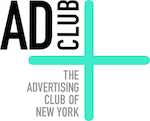What You Missed At the Last ADTHINK — What’s Trending at the Intersection of Technology + Agencies + Brands + Publishers

Last week, The AD Club of NY, in partnership with REDBOOKS, invited some of our industry’s most interesting startups to pitch their company to some of marketing’s brightest minds as part of our 11th ADTHINK event. Moderated by Gina Waldorn, Co-Founder & COO of Evol8tion, the event featured four groundbreaking startups, Adaptly, Macromeasures, oneQube and Revfluence, each pitching their company. Our ‘shark tank’ of esteemed panelists included Lou Aversano, Chief Executive Officer, Ogilvy & Mather New York; Afdhel Aziz, Brand Director, Absolut Labs (Pernod Ricard); Paul Nicholson, SVP, Production & Technology, Showtime Networks, and Deacon Webster, Chief Creative Officer, Walrus.
The conversation extended beyond the startups’ pitches to touch upon some of the industry’s hottest topics, including where data should live, what happens at the intersection of creativity and technology, and the art of the pitch. This illuminating evening was a great wrap up to the year.
We would like to extend a special thanks to our sponsor Davis & Gilbert as well as our wonderful startups and panelists for sharing their ideas and informing us about the trends, platforms and solutions that are shaping the advertising, marketing and media industries.
Here are the three key takeaways from this month’s ADTHINK event:
Data needs a human touch. Lou Aversano of Ogilvy & Mather NY believes that data must live in all levels within agencies. Data must inform what is happening within all departments because it is fundamental to the strategic process and not only tells us which marketing approaches are successful, but it lets us know which ones need improvement.
However, you must use data wisely. When data is used in isolation, something called the “hungry ghost problem” develops. Afdhel Aziz of Absolut Labs explained the “hungry ghost problem” as the instance when a consumer has already made their purchase but they continue to receive the same online recommendation for that product. This, he says, happens when the ‘person’ behind what’s collecting data is a computer, and it proves that a bot is unable to interact with the consumer effectively. When it comes to brand building, it is all about learning how to balance data with humanity.
Creativity and technology go hand and hand. Video (technology) never killed radio and data won’t kill creativity. Consumers will always buy things, so instead of bombarding consumers with something they don’t want or necessarily need, use technology and data, as well as creativity, to create a tailored experience for the consumer.
Creativity will always be needed, so let’s try not to worry that technology is about to do to the ad industry what it did to the music industry. And while ad blocking presents a challenge to brands and marketers, advertisers just have to focus on delighting the consumer with the right creative content, which can be done if creativity and technology are effectively used and well balanced.
Perfect your pitch. Startups need to know that there is a method to pitching potential clients. Being able to give your audience a short summary of your capabilities and how your company can realistically help their agency is key. Don’t get lost behind the jargon. Even if you have a great idea, if you can’t articulate how you have previously helped solve business challenges and what the return on their investment would be, you’ll lose the pitch.
